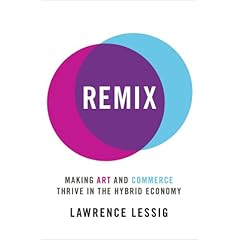Lessig: Five proposals for ending copyright wars

 The Wall Street Journal is running an excerpt from Larry Lessig's upcoming book, Remix (book party in SF, Oct. 29.)
In this excerpt, Lessig tells the story of Stephanie Lenz, who taped her infant child with some Prince song playing in the background and uploaded the video to YouTube, only to find a moment of her life deleted after Prince and Universal sent YouTube a DMCA take-down notice.
The Wall Street Journal is running an excerpt from Larry Lessig's upcoming book, Remix (book party in SF, Oct. 29.)
In this excerpt, Lessig tells the story of Stephanie Lenz, who taped her infant child with some Prince song playing in the background and uploaded the video to YouTube, only to find a moment of her life deleted after Prince and Universal sent YouTube a DMCA take-down notice.
Lenz is "collateral damage" in the copyright wars, a war that is properly fought against piracy, Lessig argues, but is sweeping up innocent people who are just trying to create something new out of the stream of media that comes our way.
The extreme of regulation that copyright law has become makes it difficult, sometimes impossible, for a wide range of creativity that any free society -- if it thought about it for just a second -- would allow to exist, legally. In a state of "war," we can't be lax. We can't forgive infractions that might at a different time not even be noticed. Think "Eighty-year-old Grandma Manhandled by TSA Agents," and you're in the right frame for this war as well.Lessig offers these recommendations:The return of this "remix" culture could drive extraordinary economic growth, if encouraged, and properly balanced. It could return our culture to a practice that has marked every culture in human history -- save a few in the developed world for much of the 20th century -- where many create as well as consume. And it could inspire a deeper, much more meaningful practice of learning for a generation that has no time to read a book, but spends scores of hours each week listening, or watching or creating, "media."
Yet our attention is not focused on these creators. It is focused instead upon "the pirates." We wage war against these "pirates"; we deploy extraordinary social and legal resources in the absolutely failed effort to get them to stop "sharing."
This war must end. It is time we recognize that we can't kill this creativity. We can only criminalize it. We can't stop our kids from using these tools to create, or make them passive. We can only drive it underground, or make them "pirates." And the question we as a society must focus on is whether this is any good. Our kids live in an age of prohibition, where more and more of what seems to them to be ordinary behavior is against the law. They recognize it as against the law. They see themselves as "criminals." They begin to get used to the idea.
That recognition is corrosive. It is corrupting of the very idea of the rule of law. And when we reckon the cost of this corruption, any losses of the content industry pale in comparison.
- Deregulate amateur remix: "We need to restore a copyright law that leaves "amateur creativity" free from regulation."
- Deregulate "the copy": "The law should ... give up its obsession with 'the copy,' and focus instead on uses -- like public distributions of copyrighted work -- that connect directly to the economic incentive copyright law was intended to foster."
- Simplify: "When copyright law purports to regulate everyone with a computer, there is a special obligation to make sure this regulation is clear. ... Tax-code complexity regulating speech is a First Amendment nightmare."
- Restore efficiency: "We should return to the system of our framers requiring at least that domestic copyright owners maintain their copyright after an automatic, 14-year initial term."
- Decriminalize Gen-X: "We should sue not kids, but for peace, and build upon a host of proposals that would assure that artists get paid for their work, without trying to stop 'sharing.' "